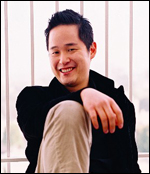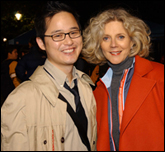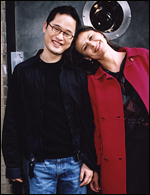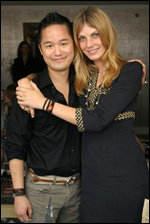
If Martha Stewart really is having a new-age awakening as she prepares to enter the clink (she just bought Body & Soul Magazine and rumor has it she intends to give her lifestyle empire a hint, at least, of green), she might want to take notes from one competitor who, at the tender age of 27, is already burnishing his reputation as America’s reigning environmental lifestyle expert.
That would be Danny Seo, the former pre-teen activist who founded an environmental organization at the age of 12 and brokered it into a top-dollar book deal, an invitation to the White House, and profiles in major glossies — all before he graduated from high school. Seo has since left the Beltway for more glamorous horizons. Now he is an environmental consultant to the stars; an editor at large for Organic Style; designer of fashion, beauty, and home products; author of three books that have put the “eco-chic” genre on the publishing map; and (are we done yet?) a green consultant to companies ranging from a boutique hotel chain to a cell-phone recycling outfit.
Later this year, Seo plans to launch a reality-TV program (on an as-yet-unnamed network) called SuperNatural Style about — you guessed it — green living. It will cover everything from high-tech green homes to organic gardens, fashion, cooking, entertaining, and pet care. The overriding theme: It is easy being green — not to mention hip, trendy, affordable … oh yeah, and planet-friendly. Seo believes that the environmental movement better hurry up and get some sex appeal, and dares eco-activists not to begrudge him for raking in six figures a year, and for naming Starbucks and General Electric among his favorite companies.
But just how far can eco-consumerism go before it’s as problem-riddled as traditional consumerism? Grist recently rang Seo at his farm in Pennsylvania (which serves as the lab and set for all things SuperNatural) to discuss whether America can really buy its way out of environmental problems, what pressing eco-dilemmas celebrities want him to sort out, and why he has wearied of politics.
Describe your coming-of-age as an activist. What motivated you to get political so early?
I’ve told this story a million times so I’ll try to not skip over details. I guess it began on my birthday: I was born on Earth Day. And I think when you’re a young kid and you share a birthday with a holiday, obviously it has an influence on you. Every year on my birthday, there were all these stories about the status of the earth and the problems with the whales and the rainforests and all these really horrific, scary stories. So every year on my birthday I was wondering if the world was coming to an end.
By the time I turned 12, I was naive enough to believe every problem I read about but also idealistic enough to believe that I could just fix it. So I decided to start an environmental group on my 12th birthday. It was a gift to me from all of my friends at my birthday party. I was like, “You can keep all the gifts you brought. I don’t want them. But you have to do something else instead.” Everyone assumed I wanted cash. But I said, “I want you to become the founding members of a group I’m going to start.” The group [known as Environment 2000] went from 12 members to 25,000 members by the time I was 18.
How did you learn the tricks of the activism trade at that age?
This was a whole period of my life when I was really, like, “The Activist.” There weren’t many adults backing Environment 2000 or running it, it was just a group of teenagers. I learned everything from lobbying and the legislative process to public relations to fundraising to grassroots campaigning. We had very effective boycotts against companies like Eddie Bauer to get them to discontinue fur use. We learned how to exploit the press, because we discovered they love to write about young people and we realized we could use the media to get our message out there and recruit members. We never solicited members; they came to us. Financial supporters came to us. We learned just by being hands-on. I even did the 501(c)(3) application myself when I was 13. There were so many spelling errors that I don’t even know how the IRS could have approved it.
So this was more than an extracurricular activity.
I failed out of high school. I was not excelling in anything. I didn’t take extracurriculars. You always hear these stories about young people who have taken on a cause but they are also, like, first in their class. They’re like these super-achievers, so polished, so perfect, and it’s almost a little bit creepy. Not me. I had no plans to go to college, no big plans to make a name for myself.

Seo cozies up with actress Blythe Danner.
And yet your name has since become a mass-marketed brand. You’ve got book deals, a TV show, product lines, you’re styling hotel chains.
There was no strategy, I can tell you that much. There was a lot of dumb luck. I mean, now that I’m running a business and now that I’ve got more of a commercial, entrepreneurial enterprise, there’s definitely a full strategy here and we know where we are going. But until about the age of 22, I was sort of just gliding along, taking whatever came my way. There was no thought put into it. I mean my first book deal, all I did was answer a phone call from Random House.
Why did you leave political activism for commercial enterprise?
The book deal was all about running a teenage organization, so it was a how-to for young people — how they could make a difference. I got a decent advance and that gave me the financial freedom to live on my own right out of high school and live anywhere I wanted to. So I decided to move to Washington, D.C., where I volunteered at various organizations to lobby for old-growth forest protections. I decided it really didn’t interest me. Working on a federal level was very frustrating.
How so?
You know what it was, and this sounds like such a naive comment, but Washington, D.C., is such a political town. You have to love politics to stay in D.C. I realized it wasn’t for me when I was invited to meet Vice President Al Gore and I’m there in the White House with a group of other young political up-and-comers and they were all so excited to meet Al Gore, and all I could think the whole time was, I wonder if anyone would notice if I took the napkins. How great would it be to have White House napkins at a cocktail party?
So you were more interested in the details of the party than the details of the politics. Did you decide then to switch gears?
When my second book was going to be published, I invited the reporter from The Washington Post who was reviewing it to my house and she kept asking questions about my furniture and the food I was serving. And when the story came out it was a lifestyle story: Is this the new lifestyle trend? Is the way you live and eat the new way to make a difference? That sort of planted a seed in my head. I thought, this is the one thing we’re not doing as a movement. We’re asking people to make lifestyle changes, but we don’t tell them how to do it. Why not provide all the how-to information, and make it beautiful and sensual and not so political, but all just lifestyle. I kept thinking — what if Martha Stewart were an environmentalist? Can you imagine how she would change this country?
But of course it had been a lifestyle movement since the ’70s, however unstylish.
Even as little as five years ago, the health-food store was like a dusty, grungy place with expired food. Beauty products were limited. Clothing — forget about it. Bedding and furniture and all that kind of stuff, you had to go out of your way and find stuff that was overpriced and didn’t feel good. You don’t want the message to be: It’s good for you. It has to be: You desire this.
Did you feel like going into the green-consumer category after your longtime commitment to political activism diminished your ethical connection to the cause?
There was a lot of criticism from my peers that I sold out. There seems to be this belief that everything I was doing was just for money — consulting celebrities, writing lifestyle books, product design. There were all these opinions that, “Oh, it’s all about Hollywood — he just wants to be with celebrities,” and all that kind of stuff. But the fact is, I’m running a business here. If I can do a successful media business that does well on the bottom line but also creates a positive message and products that aren’t hurting the environment, I don’t see the fault here. It’s very frustrating to hear criticism against people who are trying to make money while doing positive things for the environment. Basically the message is, “Don’t make money.” And I just don’t feel like I need to apologize for doing that. One hundred percent of the proceeds for many of the products and projects I work on go to charities.
So do you feel like what you’re doing is advancing the environmental cause?
Absolutely. I feel like the political organizations are a strong component of the environmental movement, but where we’ve been lacking is a movement that is consumer-driven. And I think that consumers have a lot of power in terms of moving markets and industries in the direction of environmental good.
What I’m doing is making the low-impact lifestyle accessible and easy to a broader realm of consumers. If that means I create a product that is a blend of 40 percent organic cotton and 60 percent conventional, not doing 100 percent to keep it affordable, there are going to be people who say, “Well, you’re still promoting and using chemically grown cotton.” But in our view, it’s pretty astonishing that a national retailer is moving in the direction of organic materials. It’s one big step at a time. And if your attitude is, “Well, it has to be all or nothing,” you’re going to get nothing.
Of course, it’s a fine line: How much do we have to dilute environmental principles to make them appealing or adaptable to the mainstream?
Well, look at the hybrid-engine car. I mean, it still uses gas, but it’s a big step in the right direction. And it’s easy to market: There’s a sense of status that comes from driving a Prius. It says, “I’m smarter than you because my car doesn’t represent how much money I’m worth. It represents what I contribute to the world.”
But the danger is that if the emphasis is on consumerism, the message that goes out to people is that we can just buy our way out of our problems. And in the end, buying three T-shirts made of an organic-blend cotton is no better for the environment than buying one made of chemically grown cotton. In other words, telling people to buy green products is still promoting resource-intensive practices.
I think that’s sort of a negative way to look at it. The reality is even your hard-core environmentalists need soap. They’re probably going to need a pillow to sleep on. A comforter. A bed. They need a car. They may need a car. These are basic necessities.
We’re not encouraging people to buy their way to be greener, we’re just encouraging them to change the way they buy the things they need. The message isn’t “buy more” but “buy right.” I sort of see it as my job to promote the products and the ideas and the retailers who are in the vanguard of doing green things, and to make consumers aware of these products and draw them into the stores.
Are you concerned about greenwashing?
No. I think that there are really very few consumer companies that greenwash today. They’re too scared of being exposed and losing consumer confidence. I really believe a lot of these companies really have great integrity and are determined to create the finest products that are as green as possible.
What would be an example of some of the products that pass muster?
For the longest time, I wouldn’t endorse a kitchen cleaning product because it was too hard to find and too expensive. But I found one at Target by Method Home for about three bucks, smells like cucumber, biodegradable, and not tested on animals. I mean, how great is that! I like Ethos bottled water. It’s a peace organization and I think the packaging is really sexy, too. Recycline makes these great toothbrushes from Stonyfield yogurt cups. On big-ticket items, I love General Electric. They have a lot of the really sexy stainless-steel products in their Energy Star line. I just love the GE Profile signature fridge, but it’s $5,000 so I just can’t justify buying it. Also I really love Starbucks’ shade-grown and organic coffees.
Does it concern you that GE and Starbucks are major international corporations, and therefore driven to cut costs, use cheap labor, import resources, and devastate local businesses? Not to mention the fact that there are problems with the environmental practices of both of those companies, GE in particular?
I think it’s a generalization. It isn’t true that all major corporations are insensitive to local communities and their needs. Some companies do that, but there are many — such as a Starbucks, such as a GE — that are actually very sensitive and working hard on not being one of those monsters. On top of it all, these are the companies that can effect the biggest change, and these are the companies that can actually fund the research and technology that have a sweeping change. Look at the automotive industry — they’re all big companies. We can’t just write them off. The fact is, these are the companies where people shop.

Palling around with comedian Tracey Ullman.
What kind of consulting are you doing with celebrities?
Originally my business had nothing to do with Hollywood. I never actively solicited any actors or actresses or musicians to work with. But once you write a couple of books, you become an authority on an issue. I’m really not a star fucker. These people came to me. There are a lot of examples where celebrities had real problems. They wanted to know how to do the right thing and be role models for the right thing.
What are some examples?
There was an actress who was really concerned about conflict diamonds, but she was pressured to wear gemstones to a red-carpet premiere. So I worked with her to find non-conflict diamonds that were certified and guaranteed to the point where we knew where it was mined and who mined it. Or there will be celebrities who call and say they have a pool and don’t want it to be chlorinated. How do I create a freshwater pool? I’m happy to help them out because when they go onto a talk show or do an interview they can talk about this stuff. And the reality is a lot of our pop culture comes from celebrities.
There’s one actress, when she gets interviewed she’s like, “I’m wearing completely recycled cashmere. I believe in wearing recycled materials, but it looks pretty too and I just love it.” She’s smart about talking that way, so it doesn’t come off as just environmentally conscious, but sexified. Oh my god! How funny — she just instant-messaged me to ask if I think she should get one of those “Vote or Die” T-shirts like P. Diddy!

Preening with model Angela Lindvall.
What are the haute-couture outfits that you work with? Who does good environmental work in the high-fashion world?
I designed two seasons for Imitation of Christ. Giorgio Armani does a lot — he uses a lot of hemp and organic materials. Actually, I use him for a lot. Katherine Hamnett does a lot. Stella McCartney is great — her shoes and accessories are all faux leather, but it’s not a PVC-based synthetic, it’s polyurethane-based, so it’s actually not so terrible for the environment, and the products are beautiful. So for the animal-rights people it’s really nice. There are a lot of smaller designers in L.A. especially that work with recycled fabrics.
But then there are designers like Dolce & Gabbana — they’re so terrible. Not only do I not work with them, but I’ve also thrown parties in L.A. where all the guests have to sign a giant petition to get them to stop using fur. In Europe they use baby-seal fur and make coats out of it, isn’t that heinous?
In all your work with celebrities, who has impressed you as really getting it?
I really don’t name names.
Do you think celebrities are more persuasive than politicians these days?
Not necessarily, but they do define trends. And if I can get them to endorse green products and start green trends, all the better.

